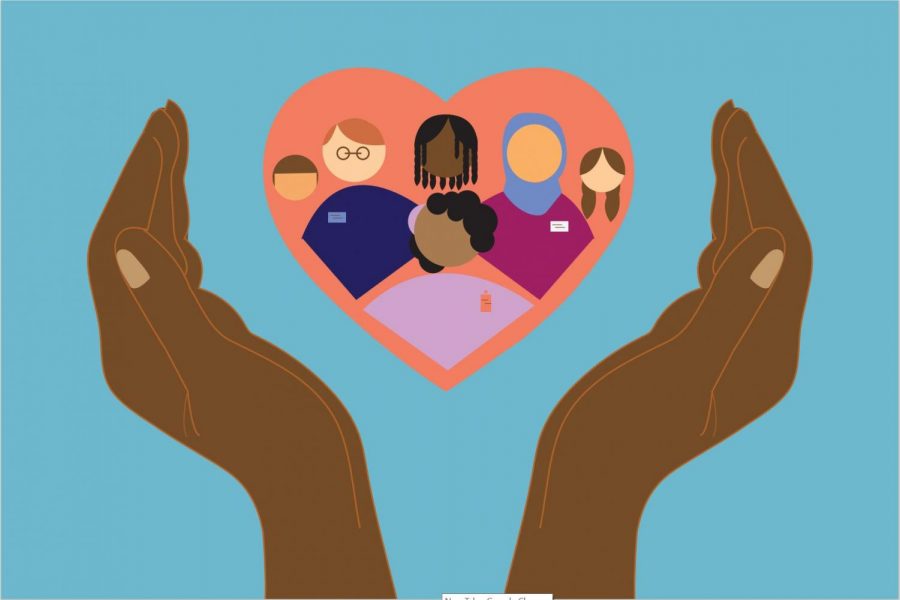OPINION: It’s time we give social workers the love they deserve
March 27, 2021
Social workers around the world have dedicated their lives to listening to trauma and working with patients every step along the way, improving communication and expression of deeper emotions.
This great commitment and dedication is recognized during March as National Social Work Month, with plenty of card exchanges, thank you notes and even association gatherings to commemorate. National Social Work Month was officially recognized by President Ronald Reagan in 1984, and has since expanded to become a global celebration. World Social Workers Day falls on the third Tuesday of March.
Oftentimes, social workers are forgotten or their role downplayed because of how prevalent they are in everyday life. Their presence provides a way for patients to open up about traumatic situations and release any pent up thoughts, reactions or feelings. Social workers provide beneficial coping mechanisms and strategies in a safe space, full of trust, help and understanding. Individual by individual, they help to create a more positive community and surrounding world.
Social workers exist in every little pocket throughout our community, in hospitals, police stations, schools and community centers. Those in crisis can easily access social workers as a supportive resource.
The average salary of a Licensed Clinical Social Worker in Kentucky starts at around $56,125, with some variation based on experience and education. However, salaries and resources were already stretched thin before the pandemic. After COVID-19 hit, they were further exhausted.
In addition to the pandemic and all of its troubles, racial and social injustice also rose to new heights, with the wrongful murders of many people of color by the hands of police and white supremacists. Such injustice led to nationwide outcry, with public protests composed of this festered communal sadness, frustration and anguish towards authorities that were supposed to be trustworthy.
This increase in unrest also led to an increased presence of social workers, who are a necessity in helping communities prevail through seemingly never ending battles. Our social workers have borne the brunt of much of this crisis, between personal impacts and heightened stressors for their patients. They take the community at its worst and help elevate it.
Sometimes, we forget that social workers are people as well: people facing the same struggles of the pandemic, financial setbacks and even mental wellness battles themselves. Recent years have seen heavy stressors on both social workers and their patients, making it difficult for them to catch their breath.
The opportunity to celebrate and recognize social workers for the challenging lifetime work they do cannot possibly be encapsulated into only a single month. The neglect of their presence and their own mental wellness shouldn’t be part of how we repay them for their sacrifices. We must cherish social workers for all they do and support them as they do us.
Social workers from around Louisville share personal tribulations within their profession, what keeps them motivated to continue their work and their hopes for the future of social work.
“Being a social worker is lifelong work. Every piece of advice we share can change the course of someone’s life, which makes every interaction detrimental. You have to separate your feelings and problems from your patient’s or you won’t be able to help the patient reach clarity,” Clarissa Simms, a licensed clinical social worker (LCSW) for 12 years, said.
“Social work is a difficult profession to stay positive in. Hearing the trauma that clients experience without showing elaborate emotion is a hard pill to swallow. You wish you could do more in your position, but sometimes there’s just no money, resources or just a safety net to save them,” Quanita Moore, a LCSW for seven years, said.
The career also provides great reward in seeing patient breakthroughs or positive changes in the course of their patients’ daily lives.
“People lean on us to help through panic and crisis. This is a journey for us both, learning and growing to trust in each other. Even if their lives don’t change immediately, knowing that my presence keeps hope alive is enough,” Jolie Beauchamp, a LCSW for 17 years, said.
“There is nothing like knowing and seeing someone grow from the circumstances. From the way they dress, the warmth of their skin and their willingness to smile. That smile and that laugh tell me I did my job,” Jonathan DuVry, a LCSW for 4 years, said.
The conversation surrounding mental wellness has grown and evolved to include more voices and representation, but Moore believes it still has “great leg work to do.”
“There are more Black social workers which help Black youth feel more comfortable, which is essential to combat stigmas and attack generational curses. This generation is more open to sharing and being vulnerable. I just hope that this diversity and vulnerability break down these issues at the root,” Moore said.
“Discussing emotions and even home life is touching open wounds. I hope with more people of color as part of the staff, we can help everyone heal. Not just those who have the money and access to,” Beauchamp said.
Social workers continue to be motivated to help the community, whether it be from helping others overcome barriers, witnessing vast improvements within their patients or the challenging nature of the profession. They get to see the beautiful impact and beginnings of the legacy they’ll leave, enabling change for the better.
“This work comes with a lifetime learning curve because few circumstances are the exact same. I’m expected to have answers and it’s my job to deliver,” DuVry said.
“I know that my work is essential to someone being dead or alive. It’s just that simple. It’s like being a superhero without the cape,” Simms said.
Social workers are essential in helping each day seem more manageable than the next and providing a safe haven within the community. They deserve more flowers and capes for their immense commitment and determination, more than we could ever give them. There are many ways to recognize social workers: through social media, donations to social work organizations or even giving a simple thank you.
Social workers are underappreciated, undervalued and rarely recognized for not only for their astounding commitment and impact but also their ability to provide a safe space to feel. To feel, react, share and express the pains that come with life.
Thank you for allowing us to be human.








